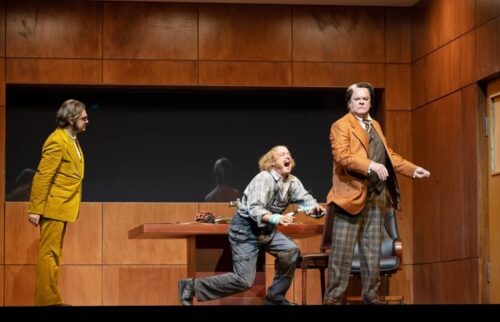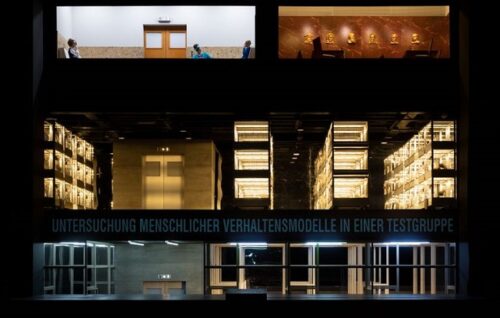 Germany Wagner, Das Rheingold: Soloists, Staatskapelle Berlin / Christian Thielemann (conductor). Filmed (directed by Andy Sommer) on 29.10.2022 at Staatsoper Unter den Linden but available until 17.2.2023 on ARTE Concert. (JPr)
Germany Wagner, Das Rheingold: Soloists, Staatskapelle Berlin / Christian Thielemann (conductor). Filmed (directed by Andy Sommer) on 29.10.2022 at Staatsoper Unter den Linden but available until 17.2.2023 on ARTE Concert. (JPr)

Production:
Director, Set Design – Dmitri Tcherniakov
Costumes – Elena Zaytseva
Lighting – Gleb Filshtinsky
Video – Alexey Poluboyarinov
Dramaturgy – Tatiana Werestchagina, Christoph Lang
Cast:
Wotan – Michael Volle
Donner – Lauri Vasar
Froh – Siyabonga Maqungo
Loge – Rolando Villazón
Fricka – Claudia Mahnke
Freia – Anett Fritsch
Erda – Anna Kissjudit
Alberich – Johannes Martin Kränzle
Mime – Stephan Rügamer
Fasolt – Mika Kares
Fafner – Peter Rose
Woglinde – Evelin Novak
Wellgunde – Natalia Skrycka
Flosshilde – Anna Lapkovskaja
This new Ring cycle by Dmitri Tcherniakov – unusually completed in one go rather than created over several years – should have been a part of the extended 80th birthday celebrations at Berlin’s Staatsoper for their long-serving music director Daniel Barenboim who was due to conduct its three cycles. Sadly, Barenboim has withdrawn from all performances due to illness and I am sure everyone would hope this is only temporary and wishes him a swift recovery. What was Berlin’s loss also became Berlin’s gain because Christian Thielemann was available to replace him in two of the three cycles.
Barenboim notwithstanding, Thielemann is possibly the Wagner conductor of his generation with many memorable performances at the Berlin’s Deutsche Oper, Dresden’s Semper Oper and the Bayreuth Festival. Thielemann does not have the relationship with those three companies that he once did and it was questioned what would be next for him. One way or another his future seems to be bright and if the reception – from both the audience and the orchestra – to this Das Rheingold is replicated in all his performances then he must be favourite to succeed Barenboim when the time comes that a success is sought. This is all the more remarkable when you realise – as the rumour mill has it – that Barenboim and Thielemann have not always been the best of friends, and this is the first time he has conducted at the Staatsoper.
Tcherniakov – acting as his own set designer – has created an amazing multifloored and multiroomed set and it looks to me that there is more money on stage than Covent Garden probably gets for an entire season of new productions. It appears to be a single building that can cross the stage or rise up and down through its different floors shown connected by a lift. Essentially, we see a research facility conducting experiments on human behaviour and it is named ESCHE; standing for Experimental Scientific Centre for Human Evolution or – for those who know their Wagner – German for (the world) ash tree. The tree which is so significant to the libretto of the Ring.
First, we see black and white video of brain cells being injected and its subsequent effects. It is being protected in an auditorium to many we will subsequently see inhabiting this Rheingold. We soon move to the blindfolded Alberich who is confined to a stress laboratory and being monitored by the white-coated Rhinemaidens with their clipboards and studied by some observers. A volunteer or not, he is surrounded by a battery of equipment some of which he is wired up to with a cap of electrodes on his head. He is stimulated initially into sexual frenzy and subsequently a desire for the riches and the power to rule the world the Rhinegold offers. It eventually becomes too much for the enraged Alberich and after wreaking havoc he breaks out of the lab taking some of the equipment with him.
After a video of some architects’ plans, we are back in that opening lecture hall. We realise from Elena Zaytseva’s costumes – mostly browns or other muted colours – that it is probably the 1970s (the huge computers seen earlier also suggested that). Wotan is obviously in charge of ESCHE and the contracts we hear mentioned are represented by the paperwork he is shown looking through in the marble lined conference room we have moved to with cameo plaques of famous composers, including Wagner, on the wall. It will be clear by now that nothing – well, almost nothing as we do eventually get a ring – Tcherniakov shows us would be recognised by Wagner. Loge is shown outside the door waiting to be invited in. Fasolt and Fafner are the not-so-giant gangster-like giants who are accompanied by four henchmen and are coming for their money having perhaps not got from Wotan what they were expecting for all their construction work. From a walkway above, Erda (another ESCHE employee?) watches on.

This upper level is connected by the lift via a floor of caged rabbits (which has proved controversial) to the basement (Nibelheim) and in between we see the slogan Untersuchung menschlicher Verhaltensmodelle in einer Testgruppe (Studying human behaviour models in a test group). Mime and others (possibly members of that test group) are trying to get Alberich’s stolen machinery working. Alberich has a ring that absolutely nobody is frightened of and the Tarnhelm is just his cap of electrodes, and he must still be suffering from delusions because it does nothing magical when he puts it on. He is ridiculed by Wotan and Loge and two attendants respond to Wotan’s phone call and come and take Alberich away.
It is clear that Alberich has lost the plot (in more ways than one!) and everyone now will actually recognise the struggle for his ring, but what is the point of gaining it? Naturally there is no gold as such, and this may just be simply the handover of stocks and shares. Fricka treats Erda as Wotan’s ‘other woman’. After Wotan settles his debts, Fafner shots Fasolt who will get dragged away. The final scene takes place in a curved foyer with a central ash tree and Donner and Froh perform magic tricks – as their party pieces – for those seated around it. Donner’s ‘mists and vapours’ come out of his sleeves, flames are produced from Wotan’s wallet, and there are other flashes and flames, including from a sword Donner brandishes, whilst Froh produces a rainbow streamer from a flower. At the end Loge just lights a cigarette before the set descends before returning up to show Wotan alone with the tree.
ARTE Concert show this entire cycle from 19 November, so I will see how it develops and the way this Rheingold fits into it so it would not be right to provide ‘summary judgement’ after just this ‘preliminary evening’. Clearly Tcherniakov will horrify traditionalists but with my long experience of human rats (Lohengrin) and animatronic crocodiles (Siegfried) at Bayreuth what is the issue with real rabbits in a Berlin Rheingold?
It is a given that – as heard through loudspeakers – this was a superbly conducted Rheingold and peerlessly played by the Staatskapelle Berlin. It took a grip on me from the first, barely audible, rumbling E-flat at the bottom of the Rhine to the brass blazing gloriously as the gods cross the rainbow bridge into Valhalla (at least in our imagination, if not on stage).
The cast was Barenboim’s and not Thielemann’s but was comprised of several fine singing-actors able to not only act but react with dramatic credibility onstage. Michael Volle is perhaps the leading baritone of his generation given the number of performances he gives and the breath of the roles he undertakes. As expected, he proves to be an exceptional Wotan, less autocratic god and more harassed CEO, and his singing was beautifully phrased with a clear delivery of the text. Equally good in their own ways were Johannes Martin Kränzle (Alberich), Stephan Rügamer (Mime), Claudia Mahnke (Fricka) and Peter Rose (Fafner) who will reappear later in the cycle along with Anna Kissjudit’s Erda and the trio of Rhinemaidens (Evelin Novak, Natalia Skrycka and Anna Lapkovskaja). (I may comment more on all these singers in further reviews.) Mika Kares brought unusual poignancy to Fasolt’s romantic yearnings for Anett Fritsch’s radiant Freia, whilst Siyabonga Maqungo sang Froh with a pleasing, sweet sound, although Lauri Vasar’s performance may have suffered from Tcherniakov’s interpretation of Donner as a geek. Dividing opinion has been Rolando Villazón’s casting as Loge, it was clear that his character was pulling the strings and had a sardonic attitude to all going on around him. Villazón always seems a fidgety, excitable and irrepressible personality and that is what he brought to Loge. Of course, his voice is a shadow of what it once was and – if he is to continue as a Wagner character tenor – sounded more suited to Mime.
Jim Pritchard
Other Ring cycle reviews can be found here.

This is the third antithetical Ring this year. Herheim down the road (Deutsche Oper), Schwarz in Bayreuth and now Tcherniakov. Having seen the whole Herheim and Götterdämmerung by Schwarz it is hard to place Tcherniakov yet in what are clearly the latest attempts at demystifying and demythologising the Ring. But, based on Rheingold it seems that Tcherniakov, albeit with too many of his psychodrama schticks on display, might be the one that actually deserves to be taken as more than just fast fading euro trash outrage. But can we wholly be expected to divorce what we see from what we hear to the extent that now seems the norm? I can live with the idea that Alberich is being processed by autosuggestion into believing that he really can become a dragon or a frog but when the ‘giants’ talk about Freia and her golden apples or when Wotan hails ‘Valhalla’ – no name that Fricka has ever heard of – how does that fit with the overall concept? More of these anomalies to come I think. Still, it grips which most certainly Herheim didn’t. As to the singers, I thought it par for current standards, with no real standouts. The exception must be Villazón who was frankly embarrassing and painful to both watch and hear. He didn’t deserve the boos but it is always sad when a singer wholly unsuited to a role is allowed to expose themselves to a test they can only fail. As to Thielemann I thought it old style Wagner conducting a tad too staid and luxuriant for my taste. I preferred both Runnicles and, heresy I know, Meister in their grabbing hold of the score and giving it a bit of a going-over! Can’t wait until the 19th November to see how his construction pans out but I can’t get round the thought that, starting with Castorf we are still in a blind alley regarding where Regisseurs can take us in exploring the Ring in the 21st Century. If Berlin and Bayreuth have run out of ideas who can?
Perhaps they, directors, should start to follow Wagner’s librettos & stage directions AND listen to the orchestra! That may help!